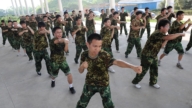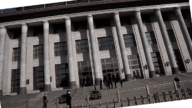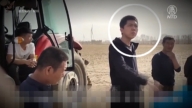【新唐人2014年01月24日訊】北京當局22號召開了「全面深化改革小組」的第一次會議,相對於官方媒體熱炒的情形,各界人士如何看待這個小組呢?本臺記者唐音23號採訪了旅美歷史學家余英時、及「中國民主黨」創始人之一——陳忠和,還有《新唐人》時事評論員藍述。讓我們一起去看看他們怎麼說。
中共國家主席習近平,22號主持了「全面深化改革領導小組」的第一次會議。據官方報導,這個小組分為經濟體制、政治體制、文化體制、社會體制、生態文明體制和中共黨務制度這六個專項小組。小組的主要工作是統籌、制定方案、檢查落實和調研。
84歲高齡的旅美歷史學家余英時,觀察中共幾十年來的施政表現。他認為,這個小組要推行的所謂「改革」,非常空洞、沒有意義。
旅美歷史學家余英時:「(笑)沒甚麼含義,它就是敷衍一下,用些很空洞的話來應付一下。因為你看它現在所作所為絕對不可能有甚麼改革可言。那都是廢話。把貧富不均搞清楚,把市場開放了,要把壓迫言論自由取消了。人權不肯放鬆,那還談甚麼呢?」
在所謂「全面深化改革小組」出爐的同一天,22號,北京第一中級法院開庭審理「公盟」組織發起人之一的,大陸法律學者許志永案。許志永和他的辯護律師張慶方,以沉默抗議法庭執法違法。而庭外大量要求無罪釋放許志永的民眾,也遭到警方抓捕。
23號,大陸各大媒體熱炒「全面深化改革小組」的公報。微博上、和各級官方媒體及國有單位,紛紛轉載這一消息,不過,跟貼的民眾寥寥無幾。「全面深化改革小組」也沒有登上當天的綜合熱搜榜。
流亡歐洲的中國民主黨創始人之一陳忠和:「沒有用的,這根本不是主流問題。那主流問題就是要拋棄這個獨裁專制才行,那才算是真正改革。它這都是修修補補,實際上都是在延長共產黨獨裁專制的壽命,所以說這些花架子沒有用的。現在中國的主流民意是對共產黨怎麼革命的問題。」
去年11月,中共「十八屆三中全會」上,通過有關「全面深化改革」的重大問題《決定》中,明確寫有,改革要堅持馬列主義、毛思想、鄧理論、三代表等,以及「堅持黨的領導」。
陳忠和:「因為現在它的核心價值就是獨裁專制,這個獨裁專制是不可侵犯的。誰侵犯了它獨裁的統治,就是對它核心價值的侵犯。所以說,它這個改革是不可能的。」
《新唐人》時事評論員藍述分析,中共推出的這個所謂「深化改革」,面臨的重大阻力就是﹕他們內部不同的利益集團。
去年年底,大陸資深媒體人高瑜爆料,中共前政治局常委、政法委書記周永康已經被雙規。海外媒體廣泛跟蹤報導,中共官方對此不置一詞。有分析指出,因為中共高層對如何處理周永康,至今無法達成共識。原因是﹕中共前黨魁江澤民作為公認的周永康的後臺,必然反對周永康被公開審理,而只要求在黨內處分周永康。
《新唐人》時事評論員藍述:「那麼很多東西就不公開了,那實際上起不到觸動周永康背後江澤民和江系的利益集團。第二,周永康的案件直接牽扯到的江澤民本人和家人,那麼這個小組敢不敢去動?如果它不敢,那所謂的深化改革就是一句空話。」
最近「國際調查記者聯盟」獲得由告密者提供的資料中,中共眾多高官及其家屬享有離岸帳戶。而觀察家發現,其中沒有江派官員。有分析指出,這是中共現任高層抓捕周永康後,江派集團利用國際媒體所做的一次反撲。
觀察人士表示,所謂改革,只是中共內部權力和利益的再分配而已。中共自稱改革進入「深水區」、要打「攻堅戰」,民間只當作笑話來看。
採訪編輯/唐音 後製/陳建銘
Comprehensively Deepening Reforms Meets With Cold Public Reaction
On January 22, Beijing authorities held the first meeting
of the “Group for Comprehensively Deepening Reforms”.
What has been the Chinese publics reaction
compared with coverage by official media?
On January 23, our reporter Tang Yin
interviewed China historian Yu Yingshi.
Our reporter also spoke to Chen Zhonghe,
co-founder of the “China Democracy Party”,
and NTD political commentator Lan Shu.
On January 22, Chinese President Xi Jinping
presided over the first meeting of the “Group
for Comprehensively Deepening Reforms.”
According to official coverage, the lead
group is divided into six special areas.
These are economy, environment, politics,
culture, social system, and Party structure.
The main work of this lead group is to
co-ordinate, plan, implement and investigate.
Yu Yingshi is a US-based China historian.
He believes the group implementing these
reforms is very empty and meaningless.
This analysis comes after 10 years of observation
of the Chinese Communist Party ‘s performance.
Yu Yingshi, China historian: “It has no meaning,
it is a perfunctory look with some empty words.
This is because it is absolutely
impossible to speak of reforms.
It’s all nonsense, with inequalities in wealth,
unopened market, and oppression of free expression.
How could they talk about reforms,
without improving human rights?
On the same day as the meeting of the “Group
for Comprehensively Deepening Reforms,”
Beijing First Intermediate People’s Court opened
a court session opened the case of Xu Zhiyong.
Xu Zhiyong is co-founder of the
Open Constitution Initiative NGO.
Xu Zhiyong, a Mainland legal scholar, and his lawyer
Zhang Fang, remained in silence during the hearing,
in protest against illegal law enforcement in the court.
People gathered outside the court to
support Xu ‘s release were arrested by police.
On January 23, state-controlled media
reported on the discussions of the reform group.
Microblogs, official media and state institutions have
reproduced this news, but few people posted comments.
This news was also not high on
the search term listing that day.
Chen Zhonghe, one of the founders of the
China Democracy Party, in exile in Europe:
“It ‘s useless because it is not a main issue.
The main reform is to abandon dictatorship.
They are actually trying to extend the life
of the Party dictatorship by patching it up.
The main public opinion is one of removing dictatorship.”
Last November, the CCP 18th Third Plenary Session
passed resolutions for comprehensively deepening reforms.
These clearly stated that the reforms must adhere to
Marxism-Leninism, Mao Zedong Thought, Deng Theory,
three representatives, and “upholding Party leadership”.
Chen Zhonghe: “This is because its core value is
dictatorship, and that it ‘s dictatorship is untouchable.
The invasion of dictatorship is equal
to the invasion of its core value.
So the reforms it suggests are impossible.”
NTD political commentator Lan Shu analyzed this
significant resistance to the deepening of reforms.
It is the different interest groups that exist internally.
At the end of last year, Gao Yu, a senior media person,
released information that Zhou Yongkang, former
Politburo Standing Committee member, and Secretary
of the Politics and Law Committee, has been detained.
This was widely reported by overseas media,
but Chinese official media did not cover the story.
Some analysts suggest this is because the Party leadership
hasn ‘t reached a consensus on how to deal with Zhou.
Zhou Yongkang was a member of a faction
headed by former CCP leader Jiang Zemin,
who must be opposing a public hearing.
Lan Shu, NTD political commentator:“They can ‘t
touch Jiang Zemin, nor the interests of his faction.
There are many things that are not disclosed.
Secondly, can this group touch Jiang Zemin
himself, or his family members, if they are
directly involved in Zhou Yongkang ‘s case?
If they dare not touch him, so-called
deepening reforms is just empty talk.”
Recently, the International Federation of Journalists
obtained information indicating that many CCP
officials, and their families, have offshore accounts.
The observers found that none of the
officials from Jiang ‘s faction are in this report.
Some analysts suggest this information was
released as part of a counterattack from the
Jiang faction, in retaliation to Zhou Yongkang ‘s arrest.
Observers said that so-called reforms are just
the re-distribution of internal power and interests.
The so-called “deep water” of reforms and the
“tough fight” are just humorous to Chinese people.
Interview & Edit/Tangyan Post-Production/Chenjianmin





























